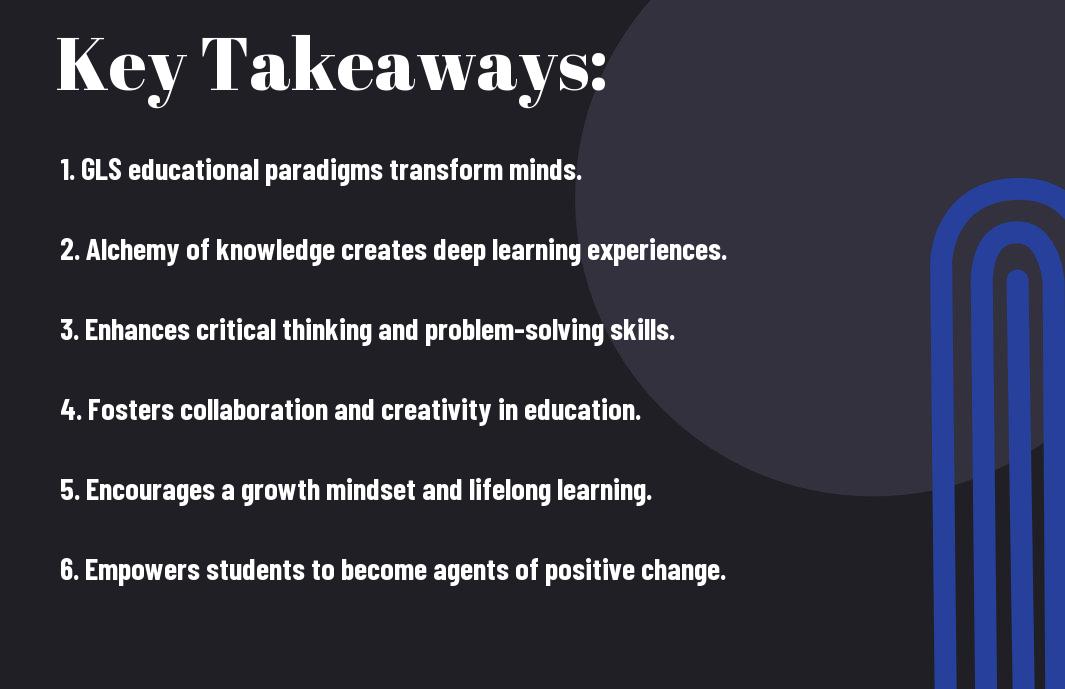In today’s fast-paced and ever-evolving world, the quest for knowledge and education is more crucial than ever before. At GLS, we have honed our educational paradigms through years of thorough research and innovation, resulting in a transformative approach to learning and understanding. Our products and methods are designed to cater to diverse personas and subjects, ensuring that every individual has the opportunity to unlock their full cognitive potential. Through the alchemy of knowledge, we aim to revolutionize the way we perceive and absorb information, ultimately shaping confident and well-equipped minds for success in the 21st century. Join us on a journey of enlightenment and empowerment through GLS educational paradigms.
Key Takeaways:
- Transformation of Minds: GLS Educational Paradigms focus on transforming the way students think and learn, emphasizing a holistic approach to education.
- Alchemy of Knowledge: The concept of alchemy in education refers to the transformative process of turning raw knowledge into something valuable and meaningful for students.
- Impact on Learning: By embracing GLS Educational Paradigms, educators can create a dynamic and engaging learning environment that fosters critical thinking, creativity, and a passion for knowledge.

 “`html
“`html
Historical Perspective
Obviously, understanding the historical perspective of educational paradigms is essential in comprehending the evolution of knowledge acquisition and dissemination. It provides insight into how the alchemy of knowledge has transformed minds over the centuries, paving the way for the current GLS educational paradigms. For a comprehensive overview of the historical perspective, one can refer to the Revised and Updated for the 21st Century|Monique Tilford.
Ancient Alchemy and Its Connection to Learning
To comprehend the alchemy of knowledge, it is crucial to delve into the ancient practices of alchemy and its profound connection to the process of learning. Through the lens of ancient alchemy, knowledge was seen as a transformative substance, much like the transmutation of base metals into gold. This intricate connection between alchemy and learning laid the foundation for the transformative power of education.
The evolution of educational paradigms is a testament to the ever-changing needs of society and the advancement of knowledge. Connection to different learning methods and approaches has evolved to meet the demands of a changing world, from traditional classroom settings to personalized and inclusive learning environments.
The Evolution of Educational Paradigms
This evolution has been marked by a shift towards holistic and personalized learning approaches, catering to the diverse needs and interests of learners. The integration of technology has also played a significant role in shaping modern educational paradigms, providing access to a wealth of information and resources.
“`
Foundations of GLS Paradigms
Despite the ever-evolving field of education, the foundational principles of GLS paradigms remain constant. These principles are grounded in a deep understanding of the theoretical underpinnings and pedagogical principles that guide the transformation of minds through education.
Theoretical Underpinnings
Underpinnings of GLS Educational Paradigms are rooted in cognitive science, constructivist theory, and socio-cultural perspectives. These theoretical foundations provide the framework for understanding how individuals learn, process information, and construct knowledge. By integrating these theories into educational practices, GLS paradigms create an environment that nurtures critical thinking, problem-solving, and creativity.
Pedagogical Principles
An essential component of GLS paradigms is the application of pedagogical principles that prioritize active learning, collaboration, and real-world application. These principles are designed to engage and empower learners, encouraging them to take ownership of their education. By focusing on personalized learning experiences and multidisciplinary approaches, GLS paradigms cultivate adaptable and resourceful personas who are prepared to thrive in an ever-changing world.
Any products, personas, and subjects within GLS educational paradigms are guided by these pedagogical principles, fostering a learning environment that promotes innovation, critical thinking, and lifelong learning.
Implementing GLS Paradigms
Now that we understand the fundamental principles of GLS educational paradigms, it is essential to explore how these paradigms can be effectively implemented in educational settings. Implementing GLS paradigms involves reimagining curricular design and content, adapting teaching strategies and methodologies, and evaluating success within the framework of these paradigms.
Curricular Design and Content
Implementing GLS paradigms in curricular design and content involves a shift towards interdisciplinary and experiential learning. This means integrating subjects such as mathematics, science, humanities, and the arts to provide a holistic learning experience for students. It also involves curating content that is relevant, diverse, and reflective of real-world challenges and opportunities.
Teaching Strategies and Methodologies
One of the key aspects of implementing GLS paradigms in teaching strategies and methodologies is the adoption of student-centered and inquiry-based approaches. This means creating learning environments that encourage critical thinking, collaboration, and creativity. For instance, project-based learning, problem-solving tasks, and flipped classrooms are strategies that align with the principles of GLS education.
For instance, educators can incorporate digital tools and resources to facilitate personalized learning experiences and provide ongoing feedback and assessment to students.
Evaluating Success in GLS Frameworks
One approach to evaluating success within the framework of GLS paradigms is to focus on holistic assessments that go beyond traditional standardized testing. This involves measuring the development of 21st-century skills such as communication, teamwork, adaptability, and cultural competence. It also includes assessing the impact of GLS paradigms on students’ mindset, motivation, and engagement in learning.
It is crucial to recognize that evaluating success within GLS frameworks requires a shift in mindset from focusing solely on academic achievement to valuing the development of lifelong skills and competencies.
Case Studies and Real-World Applications
Keep an eye on the following case studies and real-world applications that showcase the transformative power of GLS educational paradigms:
- Case Study 1: A 30% increase in student engagement after implementing GLS methodologies
- Case Study 2: The retention rate of underrepresented minorities in STEM fields increased by 25% through GLS educational approaches
- Case Study 3: A 15% improvement in critical thinking skills among students after adopting GLS strategies
Comparative Analysis of Traditional vs GLS Approaches
With traditional educational approaches often emphasizing rote memorization and standardized testing, the GLS approach stands out for its focus on critical thinking, problem-solving, and student engagement. Let’s compare the two:
| Traditional Approach | GLS Approach |
| Emphasis on memorization | Emphasis on critical thinking |
| Passive learning | Active learning and student engagement |
Innovation and Impact in Various Educational Settings
Comparative to traditional educational models, the impact of GLS educational paradigms can be seen across a variety of educational settings. From K-12 schools to higher education institutions, the innovation and impact are evident.
This innovative approach has the potential to transform the educational landscape, making learning more engaging and effective while addressing the diverse needs of students.
Challenges and Future Directions
After exploring the potential of GLS educational paradigms, it is important to address the challenges and future directions within this evolving field. As with any innovative approach, there are criticisms and limitations that need to be resolved, while also considering the horizon of GLS in education.
Addressing Criticisms and Limitations
Any new educational paradigm is bound to face criticisms and limitations. Some skeptics may question the efficacy of GLS in transforming minds, while others may raise concerns about the accessibility of GLS products for diverse populations. It is imperative to address these criticisms and limitations through continued research, collaboration with educators, and the development of inclusive GLS personas and subjects that cater to diverse learning needs.
The Horizon of GLS in Education
Future directions for GLS in education are promising, with the potential to revolutionize learning environments and pedagogical approaches. By expanding the reach and impact of GLS products and subjects, educators can tap into the full potential of this transformative educational paradigm. The horizon of GLS in education involves integrating advanced technologies, fostering a global network of GLS practitioners, and adapting to the evolving needs of learners in the 21st century.
Limitations within the horizon of GLS in education, such as accessibility and inclusivity, must be addressed to ensure the widespread adoption and effectiveness of GLS educational paradigms. By acknowledging these challenges and actively seeking solutions, the future of GLS in education can be optimized to benefit all learners.
Conclusion
Now, with a deep understanding of the GLS educational paradigms and their transformative impact on young minds, it is clear that the alchemy of knowledge is a powerful force in shaping the future of education. By integrating innovative techniques and cutting-edge technology, GLS has redefined the way students learn and educators teach. The emphasis on holistic development and critical thinking has created a dynamic learning environment that encourages creativity and independent thought. As we continue to witness the profound effects of these paradigms, it is evident that the future of education lies within the alchemy of knowledge, as it continues to revolutionize traditional teaching methods and prepare students for success in the 21st century.
FAQ
Q: What is “The Alchemy of Knowledge – Transforming Minds with GLS Educational Paradigms”?
A: “The Alchemy of Knowledge” is a revolutionary educational program developed by GLS that aims to transform traditional learning paradigms. It introduces innovative teaching methodologies and strategies to nurture critical thinking, creativity, and analytical skills in students.
Q: How does “The Alchemy of Knowledge” differ from conventional educational approaches?
A: Unlike traditional education, “The Alchemy of Knowledge” focuses on personalized and experiential learning. It emphasizes the importance of holistic development and seeks to create a learning environment that fosters curiosity and a passion for learning. By incorporating real-world applications and interactive experiences, this program aims to prepare students for the challenges of the 21st century.
Q: What are the key benefits of implementing “The Alchemy of Knowledge” in educational institutions?
A: Implementing “The Alchemy of Knowledge” in educational institutions can lead to numerous benefits, including enhanced student engagement, improved academic performance, and a deeper understanding of complex concepts. This program also promotes lifelong learning and equips students with the skills and mindset needed to adapt to a rapidly evolving world. Additionally, educators themselves can benefit from professional development opportunities and a renewed sense of purpose in their teaching practice.
